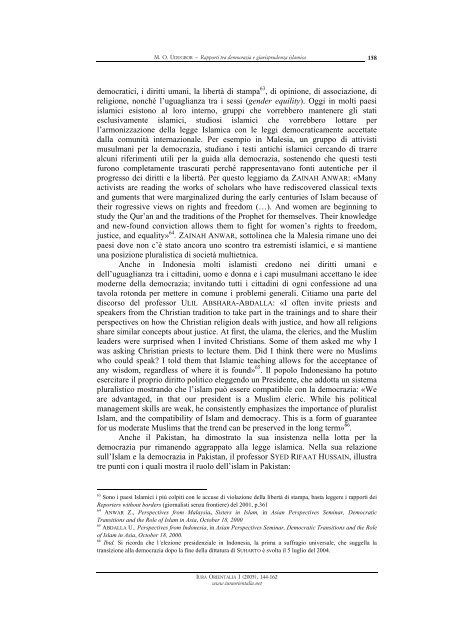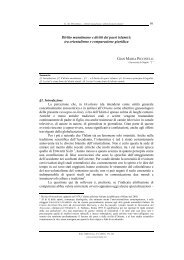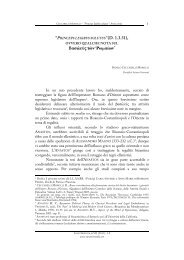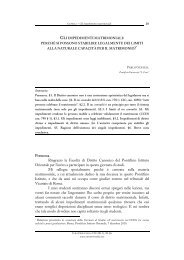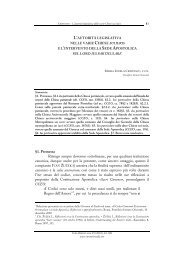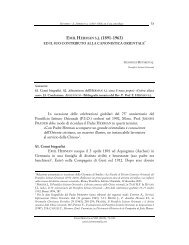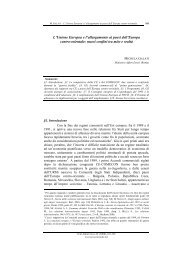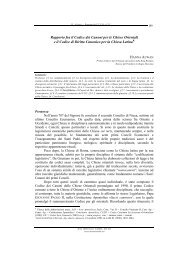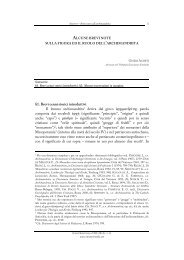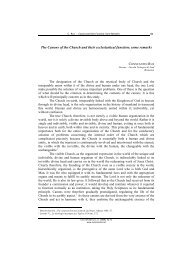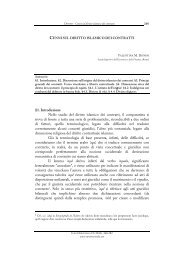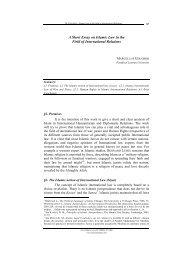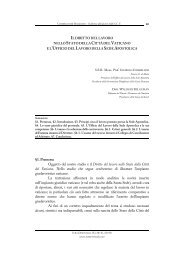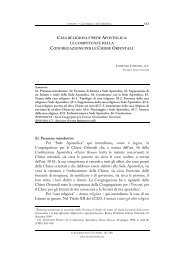di Marcellus Okenwa Udugbor - iura orientalia
di Marcellus Okenwa Udugbor - iura orientalia
di Marcellus Okenwa Udugbor - iura orientalia
You also want an ePaper? Increase the reach of your titles
YUMPU automatically turns print PDFs into web optimized ePapers that Google loves.
M. O. UDUGBOR – Rapporti tra democrazia e giurisprudenza islamica158democratici, i <strong>di</strong>ritti umani, la libertà <strong>di</strong> stampa 63 , <strong>di</strong> opinione, <strong>di</strong> associazione, <strong>di</strong>religione, nonché l’uguaglianza tra i sessi (gender equility). Oggi in molti paesiislamici esistono al loro interno, gruppi che vorrebbero mantenere gli statiesclusivamente islamici, stu<strong>di</strong>osi islamici che vorrebbero lottare perl’armonizzazione della legge Islamica con le leggi democraticamente accettatedalla comunità internazionale. Per esempio in Malesia, un gruppo <strong>di</strong> attivistimusulmani per la democrazia, stu<strong>di</strong>ano i testi antichi islamici cercando <strong>di</strong> trarrealcuni riferimenti utili per la guida alla democrazia, sostenendo che questi testifurono completamente trascurati perché rappresentavano fonti autentiche per ilprogresso dei <strong>di</strong>ritti e la libertà. Per questo leggiamo da ZAINAH ANWAR: «Manyactivists are rea<strong>di</strong>ng the works of scholars who have re<strong>di</strong>scovered classical textsand guments that were marginalized during the early centuries of Islam because oftheir rogressive views on rights and freedom (…). And women are beginning tostudy the Qur’an and the tra<strong>di</strong>tions of the Prophet for themselves. Their knowledgeand new-found conviction allows them to fight for women’s rights to freedom,justice, and equality» 64 . ZAINAH ANWAR, sottolinea che la Malesia rimane uno deipaesi dove non c’è stato ancora uno scontro tra estremisti islamici, e si mantieneuna posizione pluralistica <strong>di</strong> società multietnica.Anche in Indonesia molti islamisti credono nei <strong>di</strong>ritti umani edell’uguaglianza tra i citta<strong>di</strong>ni, uomo e donna e i capi musulmani accettano le ideemoderne della democrazia; invitando tutti i citta<strong>di</strong>ni <strong>di</strong> ogni confessione ad unatavola rotonda per mettere in comune i problemi generali. Citiamo una parte del<strong>di</strong>scorso del professor ULIL ABSHARA-ABDALLA: «I often invite priests andspeakers from the Christian tra<strong>di</strong>tion to take part in the trainings and to share theirperspectives on how the Christian religion deals with justice, and how all religionsshare similar concepts about justice. At first, the ulama, the clerics, and the Muslimleaders were surprised when I invited Christians. Some of them asked me why Iwas asking Christian priests to lecture them. Did I think there were no Muslimswho could speak? I told them that Islamic teaching allows for the acceptance ofany wisdom, regardless of where it is found» 65 . Il popolo Indonesiano ha potutoesercitare il proprio <strong>di</strong>ritto politico eleggendo un Presidente, che addotta un sistemapluralistico mostrando che l’islam può essere compatibile con la democrazia: «Weare advantaged, in that our president is a Muslim cleric. While his politicalmanagement skills are weak, he consistently emphasizes the importance of pluralistIslam, and the compatibility of Islam and democracy. This is a form of guaranteefor us moderate Muslims that the trend can be preserved in the long term» 66 .Anche il Pakistan, ha <strong>di</strong>mostrato la sua insistenza nella lotta per lademocrazia pur rimanendo aggrappato alla legge islamica. Nella sua relazionesull’Islam e la democrazia in Pakistan, il professor SYED RIFAAT HUSSAIN, illustratre punti con i quali mostra il ruolo dell’islam in Pakistan:63 Sono i paesi Islamici i più colpiti con le accuse <strong>di</strong> violazione della libertà <strong>di</strong> stampa, basta leggere i rapporti deiReporters without borders (giornalisti senza frontiere) del 2001, p.36164 ANWAR Z., Perspectives from Malaysia, Sisters in Islam, in Asian Perspectives Seminar, DemocraticTransitions and the Role of Islam in Asia, October 18, 200065 ABDALLA U.. Perspectives from Indonesia, in Asian Perspectives Seminar, Democratic Transitions and the Roleof Islam in Asia, October 18, 2000.66 Ibid. Si ricorda che l’elezione presidenziale in Indonesia, la prima a suffragio universale, che suggella latransizione alla democrazia dopo la fine della <strong>di</strong>ttatura <strong>di</strong> SUHARTO è svolta il 5 luglio del 2004.IURA ORIENTALIA I (2005), 144-162www.<strong>iura</strong><strong>orientalia</strong>.net


